Peace in the hood & goodwill toward one another needed
By Charlene Muhammad
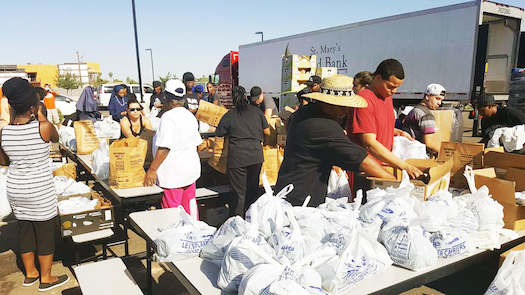
Instead of spending money and enriching others, Min. Farrakhan and the Nation of Islam are promoting acts of kindness that will increase peace, love and unity in Black neighborhoods.
Christmas is supposed to be about Jesus, joy, love and happiness, yet a mythical Santa and price-gouging merchants have taken Christ out of Christmas.
The Honorable Minister Louis Farrakhan of the Nation of Islam has called for a revolution in thinking and action this year to put Christ back into Christ-Mass.
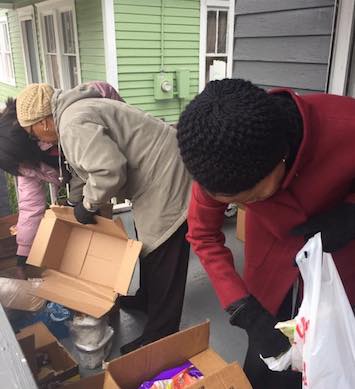
Service and unity are important and build positive relationships.
“This Christmas let’s make it a real mass for Christ,” stated Minister Farrakhan during a recent address at Mosque Maryam in Chicago. “Christ is not interested in you going in the store and making the already rich rich, putting yourself in debt for another year to give out gifts. Come on! Jesus didn’t ask you to do that,” Minister Farrakhan said.
Examine the 10th Chapter of Jeremiah in the Bible, he said Nov. 18 in a major address. Going out in the forest, cutting down a tree, taking it home, decking it with silver and gold is what heathens do, Minister Farrakhan observed, referring to the verses in Jeremiah and their warning against following the way of the heathen.
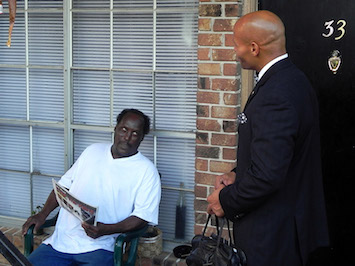
Human connections and acts of kindness can increase peace in the ‘hood.
Leave the tree, the lights, and the mythical Santa alone, and don’t ever again spend money on children and give the credit to a mythical Caucasian, making them think they’ve got to look to White people to get things that parents purchased through sweat and hard work, he said.
The Minister offered an alternative approach and activity taken from the Holy Quran’s 107th Chapter titled, “Acts of Kindness.”
A kind word and a good deed can make a difference, said activists and advocates.
“It doesn’t cost money to be kind,” he stated. A smile and kind word to one’s neighbor would be the best gift,” he said.
“But this Christmas, let love break out in the ghetto. They won’t even know what happened the next day when they see a measure of peace.”
Proof peace is possible can be found in the historic Million Man March, said Min. Farrakhan. Peace reigned that Monday, Oct. 16, 1995, as nearly two million men gathered in Washington, D.C., at the Minister’s call, and not one arrest or crime was reported.
For those with money to spend, find a Black business, spend with their own, and keep the money circulating in their neighborhood, said Min. Farrakhan.
Abdul Sharrieff Muhammad feels the theme and the work for Xmas 2018 goes back to Minister Farrakhan’s guidance and instructions during the 20th Anniversary of the Million Man March in 2015. The anniversary’s theme was “Justice or Else!”.
As head of the 10,000 Fearless Headquarters of the South and student minister at the Nation of Islam’s Southern regional headquarters in Atlanta, Mr. Muhammad pointed out how the Minister called for Blacks to make their communities safe and decent places to live three years ago. That was an act of kindness in itself, he said.
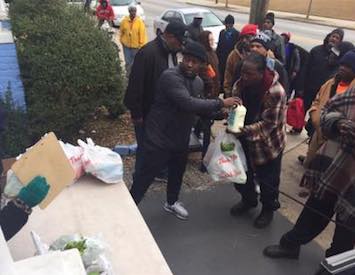
In Atlanta and other parts of the country, services and food are needed not trinkets and pricey gifts. Giving the gift of service is needed this year to put Christ into Christmas, said activists and advocates.
“The scriptures say when was I hungry and you fed me not? When was I in prison and you didn’t visit me? All that is what the Honorable Minister Louis Farrakhan wants us to do in an act of kindness,” said Mr. Muhammad.
The 10,000 Fearless Headquarters has been providing clothes, food and meeting people’s needs since 2015. “It’s freezing,” said Mr. Muhammad. “Our people are asking for food. It gives you life to help our people, and it’s an act of kindness.”
Since 2015, the Nation of Islam has called for a holiday spending boycott and “Up With Jesus, Down With Satan” to promote greater spirituality and rejection of materialism and crass consumption.
Tuesdays and Thursdays are the main days for feeding people, but it’s really a 24-hour job, he told The Final Call. “Somebody could come at that door and knock, and they’re hungry, and to see Brother Barry go in there and get on that stove and cook and feed them, when he doesn’t have to do that! He’s been doing that ever since we’ve been over here,” Minister Muhammad shared.
“I’ve seen him go and make sandwiches, when we don’t have no food, when food is short over here. I’ve seen him go in there and make a sandwich for a family that have come here late at night and ask, saying we don’t have nothing to eat,” he recalled.
Chicago Muslims feed the needy throughout the year and were encouraged to make an extra show of charity to reflect the life and mission of Jesus the Messiah.
He expressed gratitude for those who have donated clothes and shoes for the 10,000 Fearless to give away every day. “What we sometimes as a people will have in our closets, just sitting there collecting dust, it would be an act of kindness if they gave it to us and we could give it to the people because the people could use it,” Minister Muhammad said.
People are very appreciative of the food, clothing, and coats, he said. Sometimes people that live under bridges knock on the 10,000 Fearless office because it’s cold and they have nowhere to go.
“Brother Barry didn’t even know them. He allowed them to come in this house and spend the night. An act of kindness,” said Mr. Muhammad.
Carmella Muhammad, in Chicago, interacts with a young woman in a Windy City neighborhood.
Black Lives Matter in Los Angeles started an annual campaign called Black Xmas in 2014 in partnership with the Nation of Islam.
“Minister Farrakhan was calling on folks not to spend their dollars with the White corporations that keep us oppressed, and so we partnered with the Nation and helped to amplify that call,” said Dr. Melina Abdullah of Black Lives Matter Los Angeles chapter and chair of the Pan African Studies Department at California State University Los Angeles.
Every year BLMLA has from White corporations that benefit from and contribute to Black oppression and even Black deaths, she said.
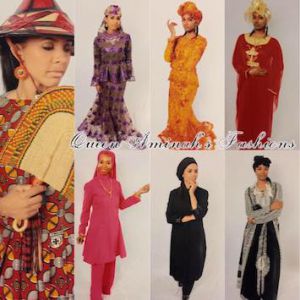
Recently, they focused on the link between White capitalism and state-sanctioned violence in their campaign. For instance, the 2014 murder of John Crawford in a Beaver Creek, Ohio, Walmart, after an employee called the police when he was simply looking at merchandise, she noted.
“What we think about during the holidays is how corporations and capitalism try to drive us to spend our money with them even though they don’t value our lives, and so we say we have power and we have the power to withhold our dollars from those corporations and use our dollars for things that actually build strong, Black communities,” said Dr. Abdullah.
Black Lives Matter Los Angeles encourages people not to spend on things they don’t need. Instead of buying grandmother who is a music lover another sweater, donate that money to places like the Fernando Pullum Community Arts Center in Leimert Park, that teaches Black children to play music for free, Dr. Abdullah recommended.
Donate to organizations that support loved ones in prison and if they do need to buy something, then buy Black, she said.
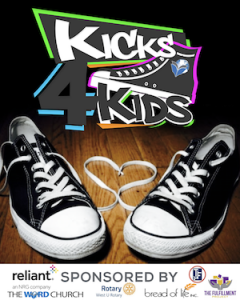
“Every day we have been profiling a Black-owned business that contributes to our community like Simply Wholesome, who hires not just young people, but also Black ex-offenders, who come out and can’t get jobs,” Dr. Abdullah explained. Black Lives Matter Los Angeles wants people to employ “Buying Black” all year long, not just in the 30-40 day holiday season.
“In November people were talking about the importance of the vote, right. If you spend your dollar, that’s a vote … . If you spend your dollars instead with a Queen Aminah, you’re voting for her! You’re saying we want your business to do well. We are voting for these kinds of businesses to grow and prosper in our community and then in turn benefit our community,” Dr. Abdullah said.
“Queen Aminah” is Aminah Muhammad of Muhammad Mosque No. 27. For years, she has not only provided clothing, jewelry, and cultural art to her community from Inglewood to Los Angeles to Leimert Park, but she, husband Larry Muhammad, and their family hold annual food giveaways.
It’s very important that the community that buys from you and supports your business that we give back. You can’t just sit in your store and your business and look at all of the hunger and the mental illness and the problems that’s going on in the community and not try to do something about it,” she said.
Making a change is what drives Sudan Muhammad and her family to go into women’s shelters and provide meals to those suffering in her Washington, D.C., community.
In Atlanta, Muslims and Christians joined forces to work to improve living conditions in a suffering Black neighborhood.
Their most consistent acts of kindness over the years have been providing homemade meals, she said. It’s not just those that are homeless and living on the streets, but mothers whose gas is turned off, with no way to prepare decent meals for their children. Some don’t have the luxury of scrambling eggs for their children or fixing hot cereal, she said.
“In the name of Allah, this year alone, I know that we’ve cooked for thousands of people in my little, teeny, tiny kitchen. Thousands,” she said.
This act of kindness comes at a time when people are being kicked off food stamps and food bank and charity cupboards are bare, added Sudan Muhammad. But, she said, Allah (God) blesses her with organic food from many sources as well as feminine products for women’s shelters.
“I had my children with me and we were serving, and one sister was in an abandoned car. The windows were knocked out in the back. She was pregnant with twins in a car, freezing to death, and the only thing I could give her was some blankets and I took the coat off my back and gave it to her,” Sudan Muhammad told The Final Call.
Serving people at the grassroots level shows how much people really need help, said Pastor Ja’Mail Johnson of the Word Church in Houston, Texas.
Many became familiar with him, wife Natasha, and their congregation during Hurricane Harvey, which pummeled Texas in August 2017. The church provided help to those devastated by the flood.
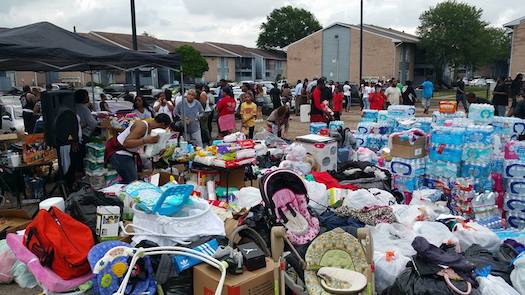
Instead of going into debt, how about opening your heart and showing compassion for others, advocates said. Houston community groups worked together and donated items after devastating storms and floods.
“Churches have a responsibility to their communities, whether it’s during the holidays, or natural disasters or not, he stressed.
Through their Fulfillment Project’s Kicks for Kids, the couple has consistently distributed shoes to elementary students, provided meals through a community food pantry, provided disaster relief aid, offered social and physical activity programs for seniors, and provided shelter and other services for battered women.
“A lot of people during this time of the year, they feel that burden to give, or, then others, depending on your tax bracket, may feel the need for the tax break, so you give and you’re wanting a donation receipt, but I will say this, there are a lot of entities, more of your larger entities: Of that dollar that you’re giving, probably only five to 10 percent is going to get to that person that’s in need,” Pastor Johnson stated. That won’t buy a stick of bubble gum in this inflated market, he said.
In Washington, D.C., Atlanta, Chicago and other cities, those committed to doing good say a great need exists and they could use helping filling that need.
“When you give to a smaller non-profit or a smaller grassroots effort, I really believe that you are touching the heart of that person, because those are the people that’s on the front lines,” Pastor Johnson said. “It never fails. When I’m in the trenches we really don’t have a lot of big entities there. They come out when there are national disasters, when the television cameras are there, when you can get a sound bite. But it’s a lot of people that are hurting and there would be no news coverage there to really capture the pain that they’re going through,” he said.
So he often struggles between disasters to get people to understand and help meet real needs regularly. “I don’t want to have to go through it and lose everything just for you to come and give me a sandwich and some Cheetos and tell me to have a blessed day,” he said.